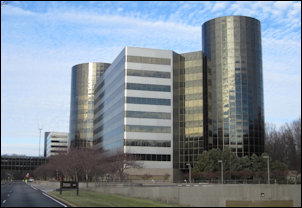Building on its plans to establish a Center for Personalized Health, Inova Health System is forging a partnership with George Mason University that will allow physicians, researchers and clinicians to work together on personalized medicine research, the two institutions announced yesterday. (See the Washington Business Journal article here.)
Inova will contribute $2.5 million in seed funding to the partnership and work with GMU to raise more money over the next few years. Much of the activity will take place in the former Exxon Mobil campus in Merrifield that Inova had previously purchased for $180 million. Inova’s plans also include a $250 million cancer institute, to be funded in part by a large donation by real estate mogul Dwight Schar. The larger vision is to build a health “ecosystem” devoted to the research, education and treatment of complex disease therapies tailored to an individual’s genetic make-up.
Meanwhile, GMU has unveiled a $40 million Advanced Biomedical Research building, rebranded its Prince William County location as its Science and Technology Campus, and started construction on a $73 million health sciences building.
These developments represent a welcome diversification of the Northern Virginia economy, which has been overly dependent upon defense, intelligence and homeland security spending by the federal government. Governor Terry McAuliffe understandably praised the latest announcement as a step in developing the “new economy” in Virginia. With characteristic enthusiasm, he said the new personalized-medicine campus could become a world leader. ” I love it because this agreement here is going to take us to the next level. … I want this facility to be the greatest in the globe.”
But the investment spree raises moral questions. For the most part, Inova Health System’s funding comes from its hospital operations. The not-for-profit Inova, which exercises near monopoly dominance in the Northern Virginia health care market, generated operating income of $218 million in 2014 on $2.7 billion in operating revenue. That’s a profit margin of about 8%, more than twice the profitability that non-profits normally need to maintain healthy operations. That translates into about $109 million in what one could classify as excess profit.
Unlike a for-profit company, Inova is not obligated to maximize profits. To the contrary, insofar as the company is exempt from taxes and has a community mission, one could argue that it is morally obligated to (a) reduce charges to patients afflicted by ever-escalating medical bills or (b) provide more care to low-income patients not covered by Medicaid.
To be sure, Inova does provide a significant volume of charity care. Its flagship hospital, Inova Fairfax Hospital, provided $151 million in 2014, according to Virginia Health Information. But the company’s high level of profitability suggests that it could do more.
Instead, Inova has chosen to plow its excess profit into economic development. I have no doubt that the personalized medicine initiative will benefit the Northern Virginia community in the long run by creating a new economic pillar in the region. The funds to do that are not likely to come from any other source. But it’s important to understand the trade-offs that Inova’s board is making here. It is extracting wealth from the community to bulk up the profits that grow the Inova empire. The people paying higher medical bills are not necessarily those who will benefit from the investment in the Center for Personalized Health.
Would I make the same decision if I served on the Inova board? Perhaps I would — I don’t know. But I’d like to hear all points of view presented. It’s a decision in which the public should have a voice.



